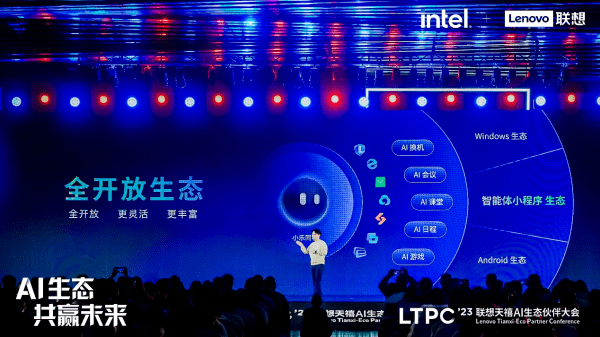
On December 26, 2023, the Lenovo Tianxi AI Ecological Developer Conference with the theme of "AI Ecosystem for a Win-Win Future" was held in Beijing. Chen Xuegui, general manager of the Internet Services Division of Lenovo China’s consumer business group, said in his keynote speech that the Tianxi AI ecological architecture launched by Lenovo has three major characteristics: comprehensive openness, device-cloud hybrid, and four-terminal integration

Chen Xuegui is the general manager of Lenovo China Consumer Business Group Internet Services Division
Full openness is the most important feature of Lenovo Tianxi AI ecosystem. Tianxi Ecosystem promotes open cooperation through the Lenovo intelligent mini-program platform. In terms of ecological construction, Lenovo welcomes and is compatible with any cloud-based large-model intelligent applets to access the Tianxi AI ecosystem. Lenovo will adhere to the concept of comprehensive openness, work with partners to build an AI-native application matrix, and gradually upgrade existing traditional applications to AI
In terms of device-cloud hybrid, although traditional cloud large models have the advantages of high performance and generalization capabilities, with the in-depth development of application fields, deployment and inference costs are high, energy consumption is large, there is a risk of privacy leakage, and the inability to Problems such as providing personalized services also limit its further large-scale application. The client-side personal private large model has the advantages of high real-time performance, low energy consumption, high security and low cost, which can make up for the shortcomings of the cloud large model. The device-cloud hybrid model can make full use of their respective advantages, complement each other, and achieve high-low matching, thereby greatly reducing the cost of using artificial intelligence for users and truly realizing the popularization of artificial intelligence
In terms of cross-terminal design, Tianxi AI architecture includes four ports: AIPC, AI tablet, AI mobile phone and AIoT. Each port has the capabilities of intelligent sensing, computing power scheduling and inference acceleration. The personal intelligence will act as the user's personal AI assistant and relay between the four types of AI terminals to achieve all-round integration. Personal agents will break through the limitations of end-side systems, communicate with users through multi-modal natural language interaction, understand the user's intentions and distribute tasks in an orderly manner, and feed back the final results to the user
The above is the detailed content of Lenovo releases fully open, device-cloud hybrid, four-terminal integrated Tianxi ecological AI architecture. For more information, please follow other related articles on the PHP Chinese website!
 c array initialization method
c array initialization method
 Can Douyin sparks be lit again if they have been off for more than three days?
Can Douyin sparks be lit again if they have been off for more than three days?
 How to use the datediff function
How to use the datediff function
 How to configure jdk environment variables
How to configure jdk environment variables
 Words disappear after typing
Words disappear after typing
 What is Bitcoin? Is it legal? Is it a scam?
What is Bitcoin? Is it legal? Is it a scam?
 How to increase download speed
How to increase download speed
 How to connect vb to access database
How to connect vb to access database




